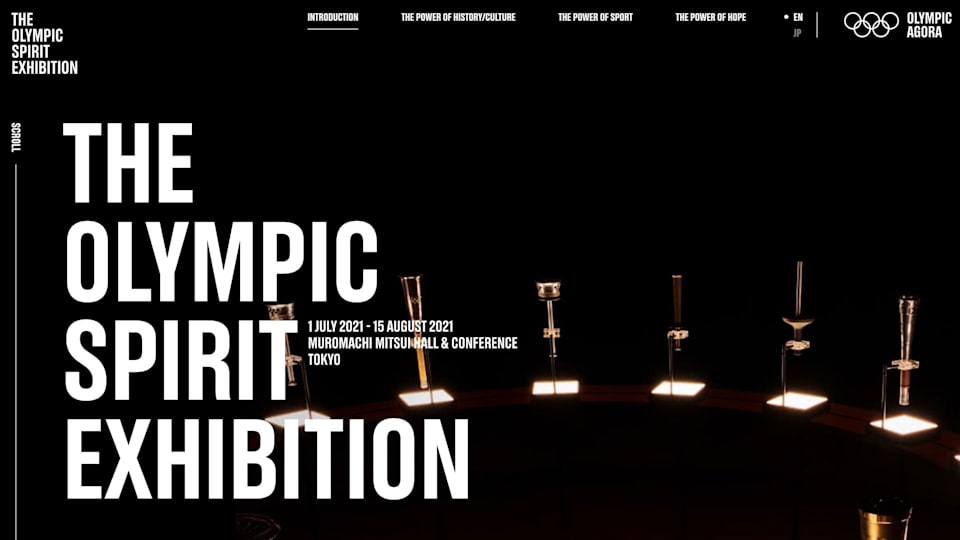Fans around the world can experience Olympic culture with virtual tours of Olympic Agora
Digital audiences worldwide can now experience and appreciate the art, culture and history of the Olympic Games that are on display at the “Olympic Agora” cultural hub. The artworks, installations and exhibition of the Olympic Agora are now on view, with all virtual tours debuting on the Olympic Agora website today.

Featuring a series of installations, exhibitions and artworks, the first-ever “Olympic Agora” cultural hub opened to the local public in Tokyo’s central Nihonbashi district on 1 July, ahead of the Olympic Games. A permanent legacy sculpture by celebrated French artist Xavier Veilhan, art photography by renowned Japanese photographer Rinko Kawauchi and a monumental installation crafted in light by groundbreaking Japanese artist Makoto Tojiki can now be viewed and appreciated digitally.
For Tojiki, his creation entitled “Solidarity and Collaboration” represents team spirit, something that is on clear display during relay races, as one athlete passes the baton onto the next. “This passing of the baton represents the transfer of responsibility and knowledge from one generation to the next,” said Tojiki. “To me, it shows that sports transcend results and are a true reflection of human excellence, friendship and respect.”
“When we think about challenging physical limitations, the concept is very tangible in sport,” added Tojiki. “But it is something that sport has in common with art and culture. As artists, we are also constantly trying to expand our capacity and capability, and trying to challenge ourselves.”
The virtual tours of the outdoor installations continue with the landmark permanent legacy sculpture by Veilhan, commissioned by the Olympic Foundation for Culture and Heritage (OFCH) as a permanent memento of the Olympic Agora at Tokyo 2020. Veilhan, who represented France at the 57th Venice Art Biennale in 2017, has interpreted the Olympic values in this life-sized sculpture entitled “The Audience”, which consists of five human figures of various ages, genders and nationalities gathered together in sport spectatorship. Describing his thought process behind the creation, Veilhan said: “The Audience is not only the title of my work, but is also the summary of the current situation that we are all undeniably living through. It is for me a reason to give existence to this public, who may be absent physically but all the more watching throughout the world. The sculpture will be its ambassador.”
Rinko Kawauchi meanwhile, no stranger to working with the OFCH, has displayed 16 new works from her “Olympism Made Visible” series for the very first time. “Olympism Made Visible”, a global fine-art photography project launched by the OFCH in 2018, highlights the Olympic values and their impact when sport is placed at the service of humankind through community-based activities. The series includes photographs taken during Kawauchi’s visit to Fukushima in 2019.
The Olympic Foundation for Culture and Heritage commissioned Rinko Kawauchi in 2019 to observe an Olympic Day Festa organised by the Japanese Olympic Committee, an event aimed at connecting Olympic athletes with disaster-affected communities in the aftermath of the 2011 earthquake and tsunami in Japan.
The Olympic Agora will be on view on location from 1 July to 15 August and online, until 15 October 2021.
The major cultural project, set in the historic Nihonbashi district of Japan’s capital, has been inspired by the public meeting places, or “agoras”, of Ancient Greece, the birthplace of the Olympics, where people gathered to eat, drink, sing, trade and exchange ideas. Resulting from Olympic Agenda 2020, the IOC’s strategic roadmap for the future of the Olympic Movement, the Olympic Agora realises a key recommendation to “further blend sport and culture” during and between editions of the Olympic Games through onsite and digital art, culture and education programmes. Each programme component explores, promotes and celebrates the Olympic values of excellence, respect and friendship, as well as the far-reaching cultural and social impact of the Games.